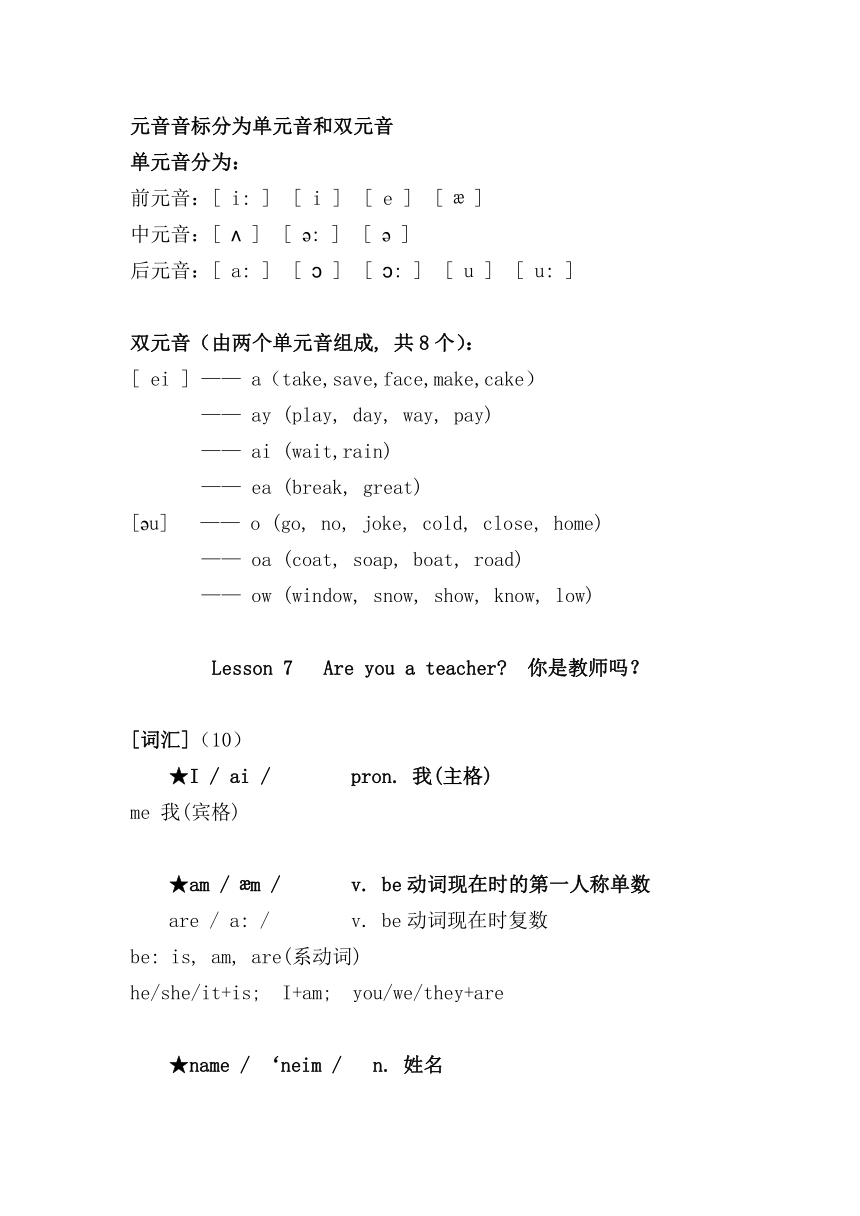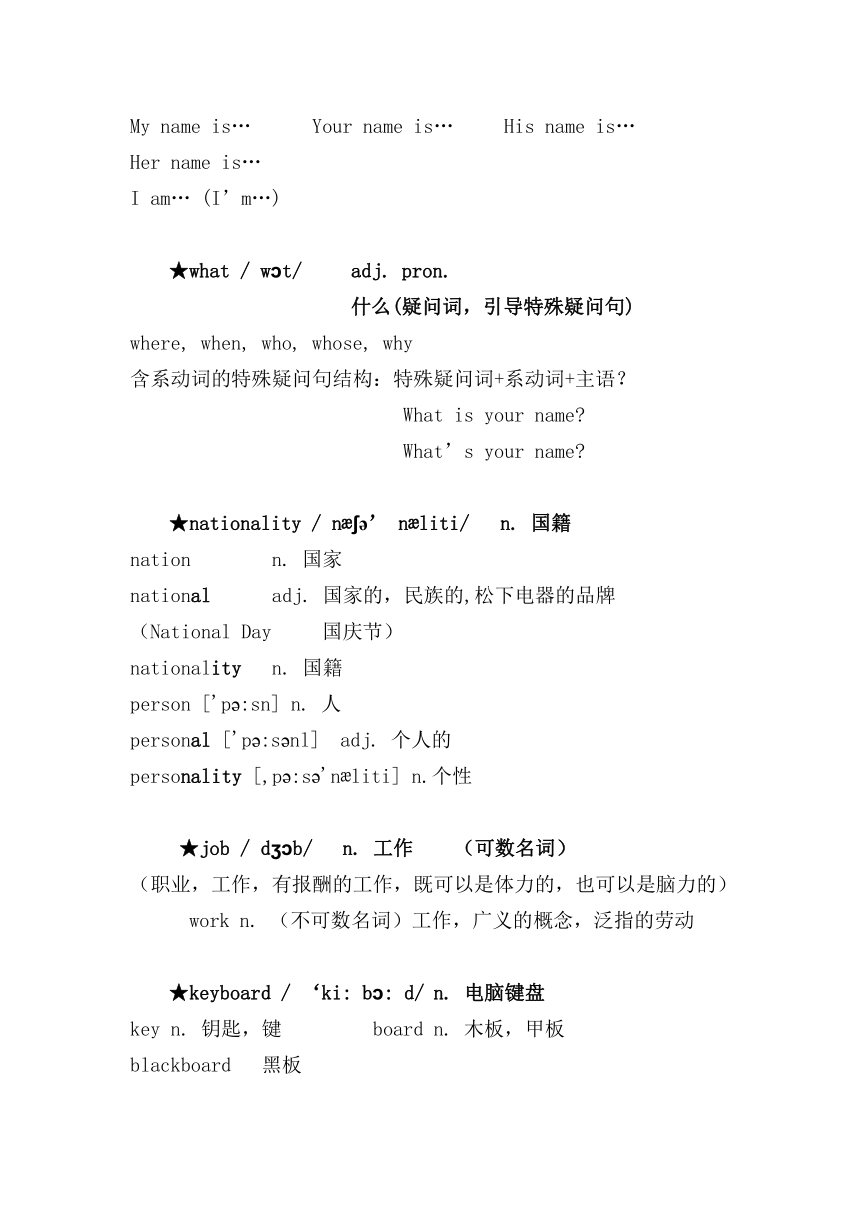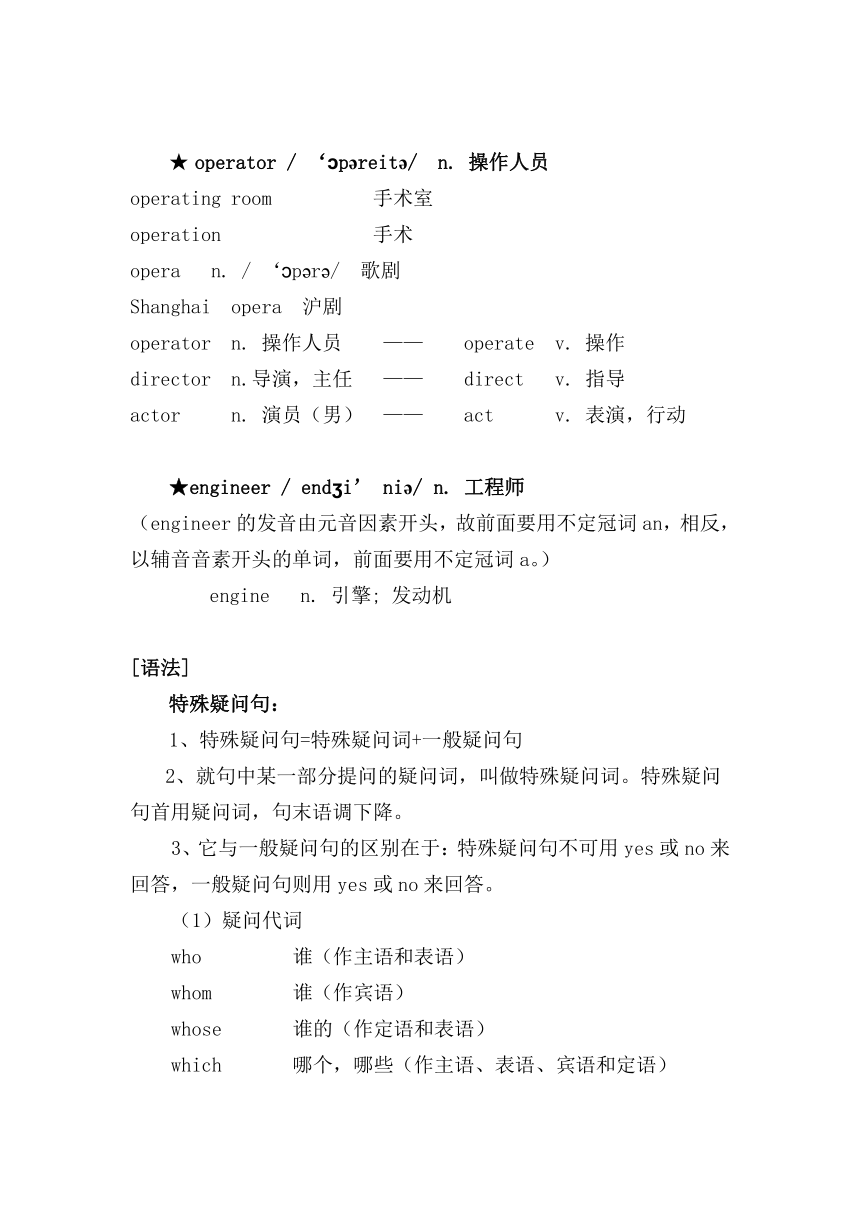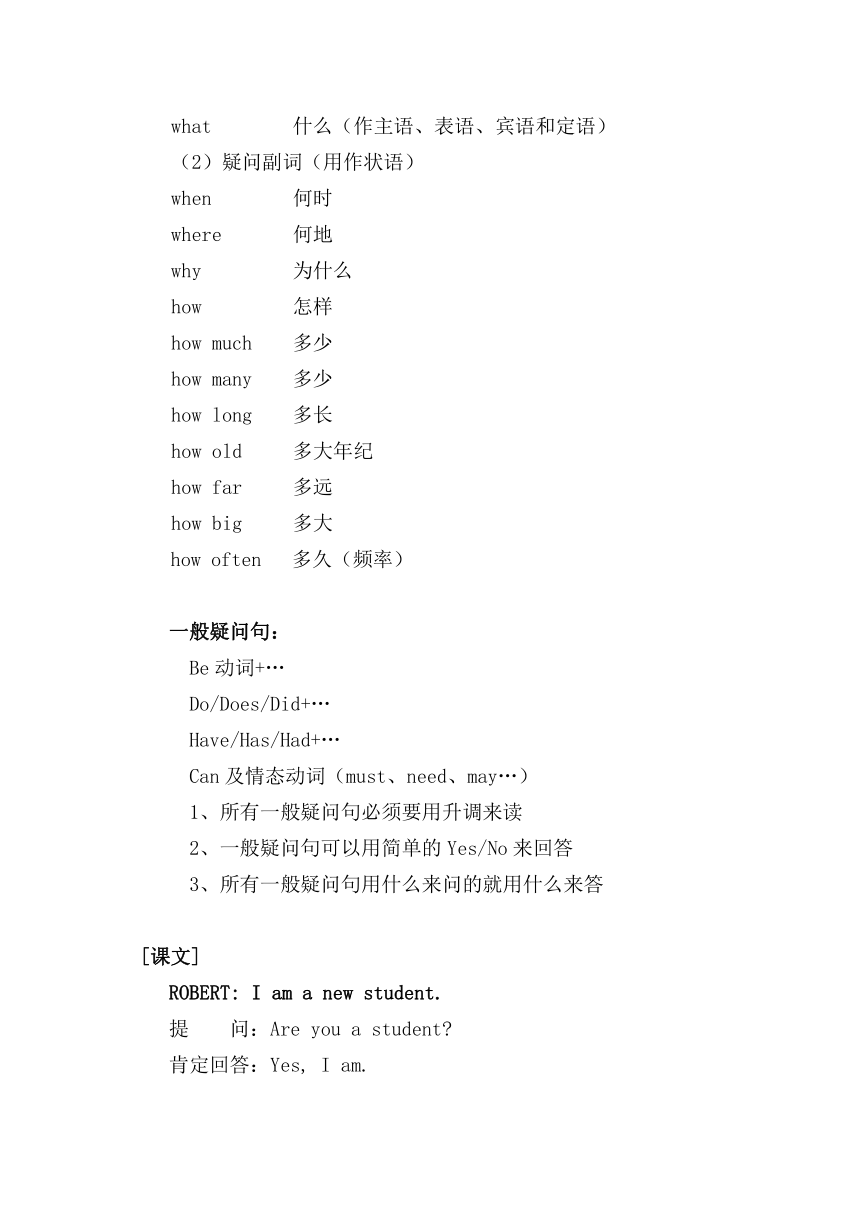新概念英语一册Lesson7-8 知识点讲义
文档属性
| 名称 | 新概念英语一册Lesson7-8 知识点讲义 |  | |
| 格式 | docx | ||
| 文件大小 | 24.3KB | ||
| 资源类型 | 教案 | ||
| 版本资源 | 新概念英语 | ||
| 科目 | 英语 | ||
| 更新时间 | 2024-02-07 15:00:01 | ||
图片预览




文档简介
元音音标分为单元音和双元音
单元音分为:
前元音:[ i: ] [ i ] [ e ] [ ]
中元音:[ ] [ : ] [ ]
后元音:[ a: ] [ ] [ : ] [ u ] [ u: ]
双元音(由两个单元音组成, 共8个):
[ ei ] —— a(take,save,face,make,cake)
—— ay (play, day, way, pay)
—— ai (wait,rain)
—— ea (break, great)
[ u] —— o (go, no, joke, cold, close, home)
—— oa (coat, soap, boat, road)
—— ow (window, snow, show, know, low)
Lesson 7 Are you a teacher 你是教师吗?
[词汇](10)
★I / ai / pron. 我(主格)
me 我(宾格)
★am / m / v. be动词现在时的第一人称单数
are / a: / v. be动词现在时复数
be: is, am, are(系动词)
he/she/it+is; I+am; you/we/they+are
★name / ‘neim / n. 姓名
My name is… Your name is… His name is…
Her name is…
I am… (I’m…)
★what / w t/ adj. pron.
什么(疑问词,引导特殊疑问句)
where, when, who, whose, why
含系动词的特殊疑问句结构:特殊疑问词+系动词+主语?
What is your name
What’s your name
★nationality / n ’ n liti/ n. 国籍
nation n. 国家
national adj. 国家的,民族的,松下电器的品牌
(National Day 国庆节)
nationality n. 国籍
person ['p :sn] n. 人
personal ['p :s nl] adj. 个人的
personality [,p :s 'n liti] n.个性
★job / d b/ n. 工作 (可数名词)
(职业,工作,有报酬的工作,既可以是体力的,也可以是脑力的)
work n. (不可数名词)工作,广义的概念,泛指的劳动
★keyboard / ‘ki: b : d/ n. 电脑键盘
key n. 钥匙,键 board n. 木板,甲板
blackboard 黑板
operator / ‘ p reit / n. 操作人员
operating room 手术室
operation 手术
opera n. / ‘ p r / 歌剧
Shanghai opera 沪剧
operator n. 操作人员 —— operate v. 操作
director n.导演,主任 —— direct v. 指导
actor n. 演员(男) —— act v. 表演,行动
★engineer / end i’ ni / n. 工程师
(engineer的发音由元音因素开头,故前面要用不定冠词an,相反,以辅音音素开头的单词,前面要用不定冠词a。)
engine n. 引擎; 发动机
[语法]
特殊疑问句:
1、特殊疑问句=特殊疑问词+一般疑问句
2、就句中某一部分提问的疑问词,叫做特殊疑问词。特殊疑问
句首用疑问词,句末语调下降。
3、它与一般疑问句的区别在于:特殊疑问句不可用yes或no来回答,一般疑问句则用yes或no来回答。
(1)疑问代词
who 谁(作主语和表语)
whom 谁(作宾语)
whose 谁的(作定语和表语)
which 哪个,哪些(作主语、表语、宾语和定语)
what 什么(作主语、表语、宾语和定语)
(2)疑问副词(用作状语)
when 何时
where 何地
why 为什么
how 怎样
how much 多少
how many 多少
how long 多长
how old 多大年纪
how far 多远
how big 多大
how often 多久(频率)
一般疑问句:
Be动词+…
Do/Does/Did+…
Have/Has/Had+…
Can及情态动词(must、need、may…)
1、所有一般疑问句必须要用升调来读
2、一般疑问句可以用简单的Yes/No来回答
3、所有一般疑问句用什么来问的就用什么来答
[课文]
ROBERT: I am a new student.
提 问:Are you a student
肯定回答:Yes, I am.
否定回答:No, I am not.(No, I’m not.)
My name's Robert.
介绍自己my name’s = my name is
介绍别人This is
SOPHIE: Nice to meet you. My name's Sophie.
Nice to meet you.= Glad to meet you.
=Nice to see you.= Glad to see you.
How do you do 回答: How do you do ( 初次见面,较正式场合)
ROBERT: Are you French
SOPHIE: Yes, I am.
Are you French, too
too和either两个词都表示“也”的意思,too用于肯定句和疑问句中,either仅限用于否定句中。too和either一般放在句末,且前面通常用逗号隔开。
ROBERT: No, I am not.
SOPHIE: What nationality are you
用于询问对方国藉=What’s your nationality
Where are you from 你是从哪儿来的?
=Where do you come from
ROBERT: I'm Italian.
或I am from Italy. (I’m from Italy.)
Are you a teacher
SOPHIE: No, I'm not.
ROBERT: What's your job
询问对方从事何种职业
What is your job 你的工作是什么?
=What’s your job
=What do you do (区别How do you do )
=What are you
SOPHIE: I'm a keyboard operator.
keybord operator = typist 打字员
What's your job
ROBERT: I'm an engineer.
Lesson 8 What's your job 你是做什么工作的?
[词汇](10)
★policeman / p ’ li: sm n/ n. 警察
合成词:police(总称)+ man(男人)
★policewoman / p ’ li: swum n/ n.女警察
★taxi driver /’t ksidraiv / n. 出租汽车司机
drive v. 驾驶 drive a taxi 驾驶出租车
★air hostess /ε h ustis/ n. 空中小姐
air 空气 + hostess 女主人
★postman /’p ustm n/ n. 邮递员
post(n.邮件 v.邮寄)+ man(男人) = postman
mail(n.邮件 v.邮寄)+ man(男人) = mailman
e-mail 电子邮件(e 是electronic adj. 电子的)
★nurse /n : s/ n. 护士
v. 护理,照顾
nurse a baby 照顾婴儿 nursing home 养老院
★mechanic /mi’ k nik/ n. 机械师
machine n. 机器
★hairdresser /’ hε dres / n. 理发师
dress 打扮 hair 头发 hair salon/hε ’s l / 美发院
★housewife /’ hauswaif/ n. 家庭妇女,针线盒
house (房子) + wife (妻子)= housewife 家庭妇女
house (房子) + work (工作)= housework 家务
★milkman /’ milkm n/ n. 送牛奶的人
milk (牛奶) + man (人) = milkman 送牛奶的人
[课文]
What’s your job I’m a policeman.
What’s your job I’m a policewoman.
What’s your job I’m a taxi driver.
What’s your job I’m an air hostess.
What’s his job He is a postman.
What’s her job She is a nurse.
What’s his job He’s a mechanic.
What’s his job He’s a hairdresser.
What’s her job She’s a housewife.
What’s his job He’s a milkman.
单元音分为:
前元音:[ i: ] [ i ] [ e ] [ ]
中元音:[ ] [ : ] [ ]
后元音:[ a: ] [ ] [ : ] [ u ] [ u: ]
双元音(由两个单元音组成, 共8个):
[ ei ] —— a(take,save,face,make,cake)
—— ay (play, day, way, pay)
—— ai (wait,rain)
—— ea (break, great)
[ u] —— o (go, no, joke, cold, close, home)
—— oa (coat, soap, boat, road)
—— ow (window, snow, show, know, low)
Lesson 7 Are you a teacher 你是教师吗?
[词汇](10)
★I / ai / pron. 我(主格)
me 我(宾格)
★am / m / v. be动词现在时的第一人称单数
are / a: / v. be动词现在时复数
be: is, am, are(系动词)
he/she/it+is; I+am; you/we/they+are
★name / ‘neim / n. 姓名
My name is… Your name is… His name is…
Her name is…
I am… (I’m…)
★what / w t/ adj. pron.
什么(疑问词,引导特殊疑问句)
where, when, who, whose, why
含系动词的特殊疑问句结构:特殊疑问词+系动词+主语?
What is your name
What’s your name
★nationality / n ’ n liti/ n. 国籍
nation n. 国家
national adj. 国家的,民族的,松下电器的品牌
(National Day 国庆节)
nationality n. 国籍
person ['p :sn] n. 人
personal ['p :s nl] adj. 个人的
personality [,p :s 'n liti] n.个性
★job / d b/ n. 工作 (可数名词)
(职业,工作,有报酬的工作,既可以是体力的,也可以是脑力的)
work n. (不可数名词)工作,广义的概念,泛指的劳动
★keyboard / ‘ki: b : d/ n. 电脑键盘
key n. 钥匙,键 board n. 木板,甲板
blackboard 黑板
operator / ‘ p reit / n. 操作人员
operating room 手术室
operation 手术
opera n. / ‘ p r / 歌剧
Shanghai opera 沪剧
operator n. 操作人员 —— operate v. 操作
director n.导演,主任 —— direct v. 指导
actor n. 演员(男) —— act v. 表演,行动
★engineer / end i’ ni / n. 工程师
(engineer的发音由元音因素开头,故前面要用不定冠词an,相反,以辅音音素开头的单词,前面要用不定冠词a。)
engine n. 引擎; 发动机
[语法]
特殊疑问句:
1、特殊疑问句=特殊疑问词+一般疑问句
2、就句中某一部分提问的疑问词,叫做特殊疑问词。特殊疑问
句首用疑问词,句末语调下降。
3、它与一般疑问句的区别在于:特殊疑问句不可用yes或no来回答,一般疑问句则用yes或no来回答。
(1)疑问代词
who 谁(作主语和表语)
whom 谁(作宾语)
whose 谁的(作定语和表语)
which 哪个,哪些(作主语、表语、宾语和定语)
what 什么(作主语、表语、宾语和定语)
(2)疑问副词(用作状语)
when 何时
where 何地
why 为什么
how 怎样
how much 多少
how many 多少
how long 多长
how old 多大年纪
how far 多远
how big 多大
how often 多久(频率)
一般疑问句:
Be动词+…
Do/Does/Did+…
Have/Has/Had+…
Can及情态动词(must、need、may…)
1、所有一般疑问句必须要用升调来读
2、一般疑问句可以用简单的Yes/No来回答
3、所有一般疑问句用什么来问的就用什么来答
[课文]
ROBERT: I am a new student.
提 问:Are you a student
肯定回答:Yes, I am.
否定回答:No, I am not.(No, I’m not.)
My name's Robert.
介绍自己my name’s = my name is
介绍别人This is
SOPHIE: Nice to meet you. My name's Sophie.
Nice to meet you.= Glad to meet you.
=Nice to see you.= Glad to see you.
How do you do 回答: How do you do ( 初次见面,较正式场合)
ROBERT: Are you French
SOPHIE: Yes, I am.
Are you French, too
too和either两个词都表示“也”的意思,too用于肯定句和疑问句中,either仅限用于否定句中。too和either一般放在句末,且前面通常用逗号隔开。
ROBERT: No, I am not.
SOPHIE: What nationality are you
用于询问对方国藉=What’s your nationality
Where are you from 你是从哪儿来的?
=Where do you come from
ROBERT: I'm Italian.
或I am from Italy. (I’m from Italy.)
Are you a teacher
SOPHIE: No, I'm not.
ROBERT: What's your job
询问对方从事何种职业
What is your job 你的工作是什么?
=What’s your job
=What do you do (区别How do you do )
=What are you
SOPHIE: I'm a keyboard operator.
keybord operator = typist 打字员
What's your job
ROBERT: I'm an engineer.
Lesson 8 What's your job 你是做什么工作的?
[词汇](10)
★policeman / p ’ li: sm n/ n. 警察
合成词:police(总称)+ man(男人)
★policewoman / p ’ li: swum n/ n.女警察
★taxi driver /’t ksidraiv / n. 出租汽车司机
drive v. 驾驶 drive a taxi 驾驶出租车
★air hostess /ε h ustis/ n. 空中小姐
air 空气 + hostess 女主人
★postman /’p ustm n/ n. 邮递员
post(n.邮件 v.邮寄)+ man(男人) = postman
mail(n.邮件 v.邮寄)+ man(男人) = mailman
e-mail 电子邮件(e 是electronic adj. 电子的)
★nurse /n : s/ n. 护士
v. 护理,照顾
nurse a baby 照顾婴儿 nursing home 养老院
★mechanic /mi’ k nik/ n. 机械师
machine n. 机器
★hairdresser /’ hε dres / n. 理发师
dress 打扮 hair 头发 hair salon/hε ’s l / 美发院
★housewife /’ hauswaif/ n. 家庭妇女,针线盒
house (房子) + wife (妻子)= housewife 家庭妇女
house (房子) + work (工作)= housework 家务
★milkman /’ milkm n/ n. 送牛奶的人
milk (牛奶) + man (人) = milkman 送牛奶的人
[课文]
What’s your job I’m a policeman.
What’s your job I’m a policewoman.
What’s your job I’m a taxi driver.
What’s your job I’m an air hostess.
What’s his job He is a postman.
What’s her job She is a nurse.
What’s his job He’s a mechanic.
What’s his job He’s a hairdresser.
What’s her job She’s a housewife.
What’s his job He’s a milkman.
同课章节目录
